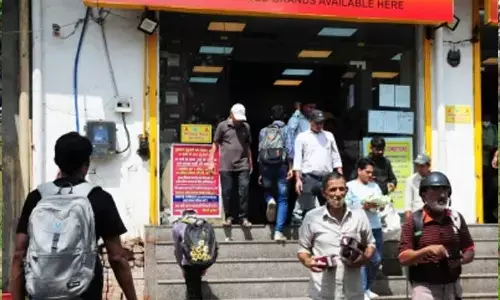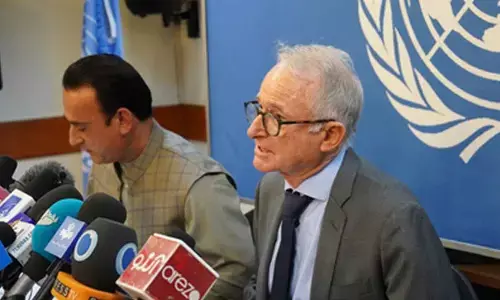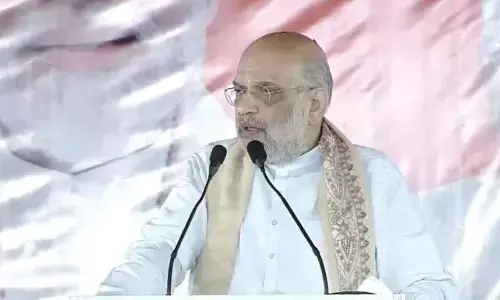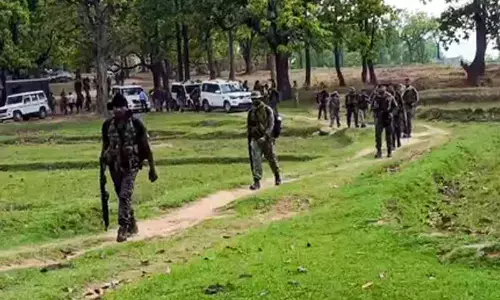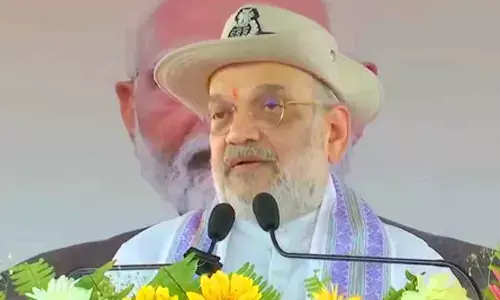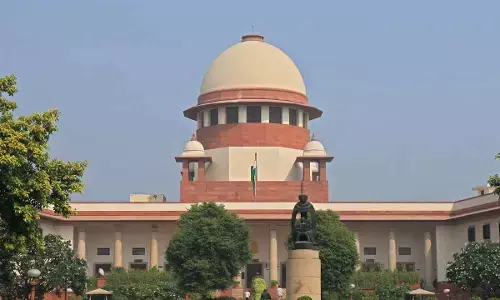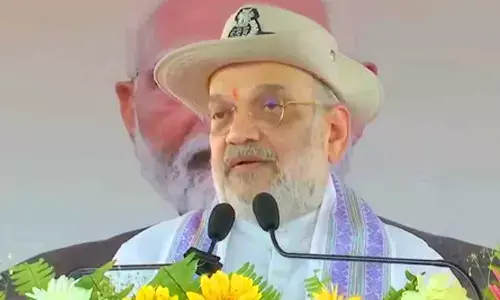Is it a real people’s democracy?

Is it a real people’s democracy?, 16th Lok Sabha, Dr AP Vithal. Politics have become a very profitable, family business. Politicians are considered the most corrupt section of our society.
Elections for the 16th Lok Sabha are round the corner. After all, timely elections, political parties, people’s representatives are the fundamental traits of parliamentary democracy. This is according to the Constitution, which we the people of India have given to ourselves with a hope that India would be a sovereign, secular, socialist, democratic republic. We expected economic, social and political justice for all our citizens; liberty of thought, expression and worship; equality of status and opportunity for all of us. We wished our day-to-day problems, hardships, poverty and unemployment would be addressed to with needed urgency and importance because of our parliamentary democratic system. What else is the holy duty of any government whatever may be its form--democracy, monarchy, dictatorship, or military rule--other than looking after the welfare of its citizens? Though democracy is not the best form of all the above surely it is less bad!
More than 60 per cent of our people are poor and innocent. But more than 60 per cent of our representatives in Parliament and Assemblies are multi-millionaires and a considerable number of them own more than Rs 100 crore. Thirty three per cent of them are having criminal cases pending against them with some of them severe in nature like rape, attempt to murder and even murder. Around fifty per cent of our population is women but there are hardly fifteen per cent our representatives are women. A bill to reserve 33 per cent of Lok Sabha seats for women is pending in Parliament for more than decade. Now can any well meaning gentleman call this parliament a true representation of our citizens? Quite often the serious, immediate issues faced by people find no important place among those discussed in parliament. Instead of getting their genuine grievance solved in an orderly sympathetic manner, people are forced to resort to serious struggles even face arrests, police brutality and even firing. Still hunger, poverty, illiteracy, ill-health, due to lack of minimum hygienic conditions like safe drinking water etc. minimum living standards are not within the reach of majority of people live in slums in cities and villages. Feudal practices are still rampant such as atrocities against women, social oppression against Dalits, minorities and especially Adivasis and Girijans.
False encounters and tortures, not only against Maoists, whom the state wants to project as enemies, terrorists, but even those intellectuals who fight for the demands of the people are not a rare phenomenon. Since the judicial process to set these right is a lengthy and expensive and often litigation becomes the way of the governance. To cut it short, the fundamental rights are still to be enforced properly and the directive principles aimed at addressing the improvement of the living standards of the people are not even justiciable.
Politics have become a very profitable, family business. Politicians are considered the most corrupt section of our society. Money and muscle power along with casteism, communalism, have become main weapons in the present electioneering. No honest ordinary citizen can even think of entering the present portals of power – parliament or assembly. Of course, there may be exceptions to this deplorable situation. The assembly segments from which a politician gets elected seems to be his own private property where his offspring or wife or his relatives should be the successors. It appears politics is the only profession which does not require any qualification and still worse, arrogance, vulgar exhibitionism of might, looking down the poor - of course except during electioneering - have become the requirements of budding politicians.
Political parties nowadays have no sound principles, no pro-people, democratic secular agenda except the agenda to somehow to grab political power and cling to it as long as possible by hook or by crook. If not how one can explain MPs of Congress party overnight could join BJP who claim to be arch political rivals? Whatever may be their projected differences on so-called policy matters, the ruling parties in the states and at the Centre are qualitatively no different in pursuing the moribund economic policies and serving the interests of native and foreign monopolies at the cost of the common people with rare exception. Whichever party is at the helm of the affairs the disparities between the rich and poor is getting aggravated to the point of repulsion.
Now let us look at the form of our parliamentary democracy let alone the content. If the rule of ‘no work no pay’ were to be implemented to the parliamentarians at least a few thousands of crores of rupees could be saved. Our people’s representatives attend the assemblies or Parliament only to walkout after a few minutes or to be suspended after a few hours or only to create sound pollution and entertainment for the live TV viewers. The spectacle of the Lok Sabha during the passage of AP State Reorganisation Bill leaves no one in doubt about the ugly degradation of our parliamentary democracy. Doors of the Lok Sabha were closed; TV channels switched off; one to one wrestling and boxing that too between members of the same party say TDP or Congress were sadly amusing.
In general whatever may be the high sounding words, quotes from Mahatma, Nehru etc., we can conclude with impunity that this parliament, parties and politicians have let down our people or at best disappointed.
Even the parties like the Lok Satta headed by IAS-turned gentleman politician Jayaprakash is falling in line with the present trend of the electoral politics having adjustments with BJP, TDP and Jana Sena of actor Pavan Kalyan. To be frank enough Lok Satta as an organisation would have had more popular moral influence and even now such civil society organisations are needed compared to the present genre of political parties.
It is unfortunate even a party like CPM, committed to Marxism and to dispel the illusions on parliamentary democracy among people and claims to participate in the electoral politics to let the people realise with their own experience about the ultimate futility of this system, it seems has itself developed illusions over our parliamentary path. If not how one can explain CPM entering into electoral adjustments with TDP and Congress in 2004 and 2009 and with AIADMK and DMK in Tamil Nadu much to the disappointment of its sympathisers, quite comfortably adjusting to the play of parliamentary politics of bourgeoisie parties? Gradually it has become one of the traditional political parties losing its special status of a proletariat party having no qualitative difference with other parties. The Maoists, another outfit of Marxian philosophy on the other hand is boycotting the elections. Not only so, it at times tries to implement the boycott using force, which is counter-productive at this stage.
For the present what is required is a judicious mixture of principled parliamentary struggles and militant extra-parliamentary struggles. United militant mass and class struggles of the toiling masses together with strong intervention of civil society through its dedicated movement can at least to a little extent correct the present perverted parliamentary democracy. Such a prolonged struggle by the people will lead to
(The writer is a medical practitioner and Marxist ideologue)


